Điểm nhấn
-
 Hội thảo “Thực trạng người Việt Nam hồi hương từ Vương quốc Anh giai đoạn 2014 - 2023”
Hội thảo “Thực trạng người Việt Nam hồi hương từ Vương quốc Anh giai đoạn 2014 - 2023”
-
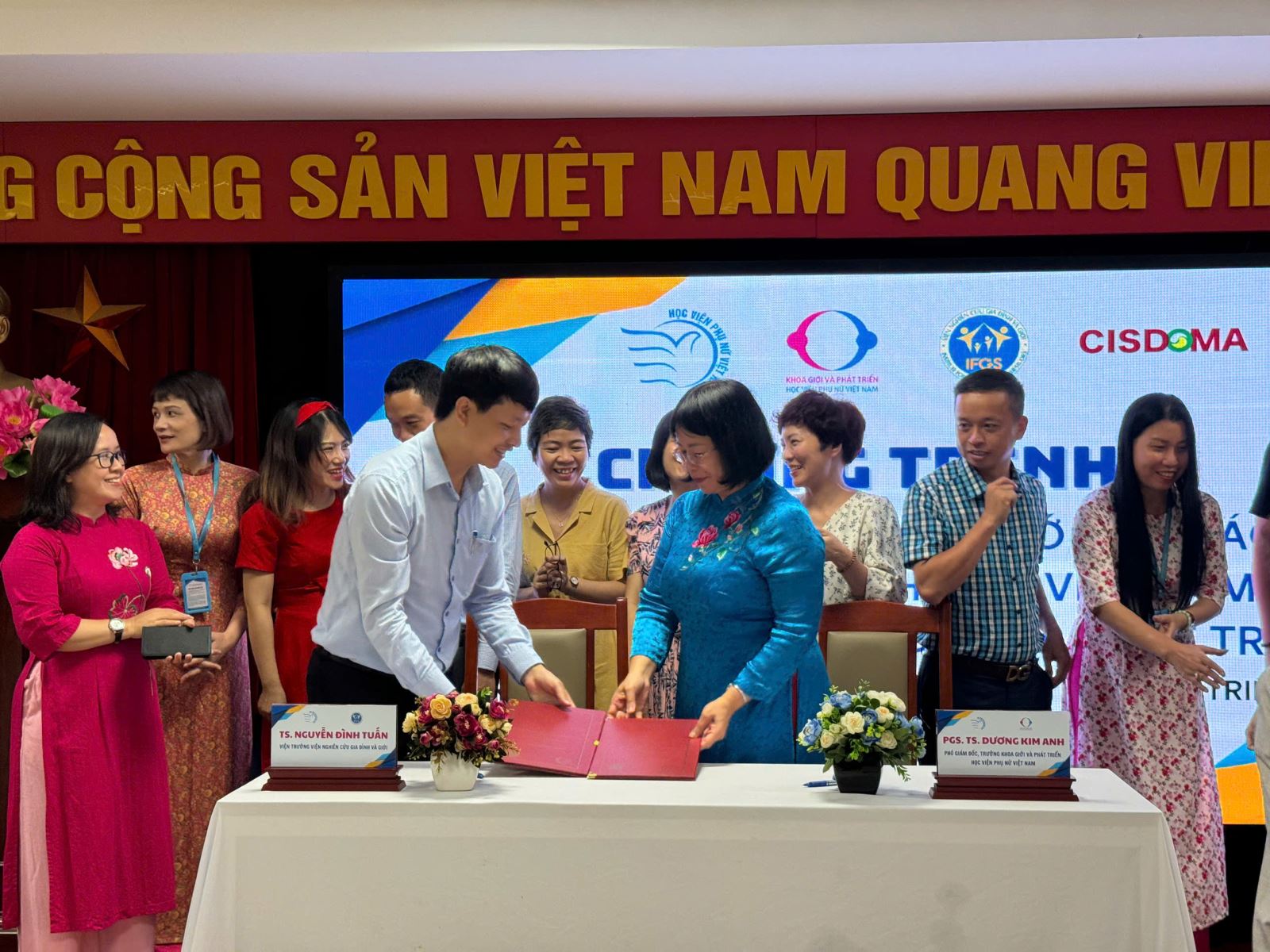 Lễ Ký kết biên bản ghi nhớ hợp tác giữa Học viện Phụ nữ Việt Nam với Viện Nghiên cứu Gia đình và Giới
Lễ Ký kết biên bản ghi nhớ hợp tác giữa Học viện Phụ nữ Việt Nam với Viện Nghiên cứu Gia đình và Giới
-
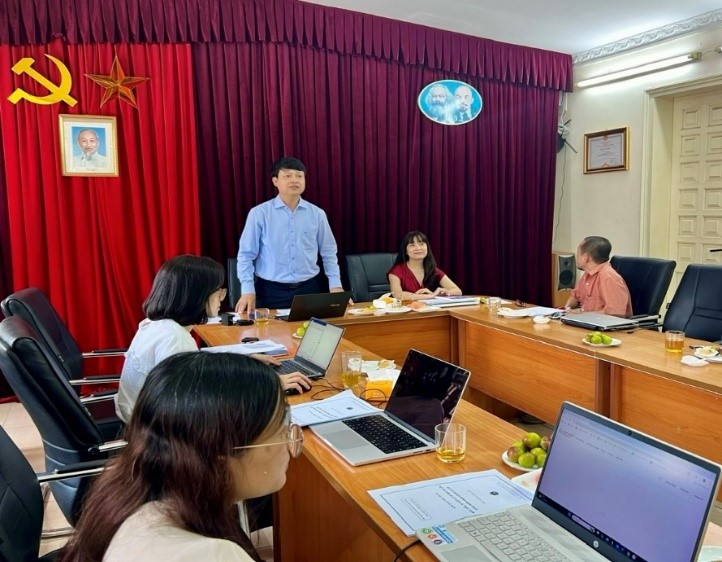 Hội thảo khoa học: "Bộ chỉ số gia đình hạnh phúc: Một số vấn đề lý luận và thực tiễn"
Hội thảo khoa học: "Bộ chỉ số gia đình hạnh phúc: Một số vấn đề lý luận và thực tiễn"
-
 Tọa đàm khoa học "Vận dụng lý thuyết trong nghiên cứu khoa học xã hội"
Tọa đàm khoa học "Vận dụng lý thuyết trong nghiên cứu khoa học xã hội"
-
 Hội nghị Đối thoại giữa Chi ủy, Lãnh đạo viện với đảng viên, viên chức và người lao động Viện nghiên cứu Gia đình và Giới 6 tháng đầu năm 2024
Hội nghị Đối thoại giữa Chi ủy, Lãnh đạo viện với đảng viên, viên chức và người lao động Viện nghiên cứu Gia đình và Giới 6 tháng đầu năm 2024
-
 Chi bộ Viện nghiên cứu Gia đình và Giới tổ chức sinh hoạt chuyên đề: Đoàn kết thống nhất trong Đảng theo tư tưởng Hồ Chí Minh
Chi bộ Viện nghiên cứu Gia đình và Giới tổ chức sinh hoạt chuyên đề: Đoàn kết thống nhất trong Đảng theo tư tưởng Hồ Chí Minh
-
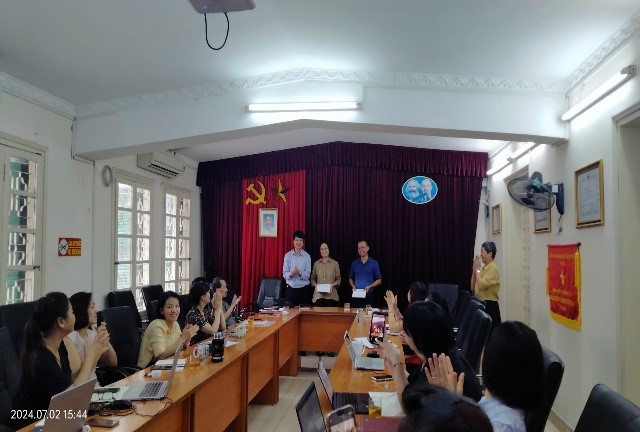 Cuộc thi “Nét đẹp và giá trị gia đình Việt Nam” hưởng ứng Ngày Gia đình Việt Nam 2024
Cuộc thi “Nét đẹp và giá trị gia đình Việt Nam” hưởng ứng Ngày Gia đình Việt Nam 2024
-
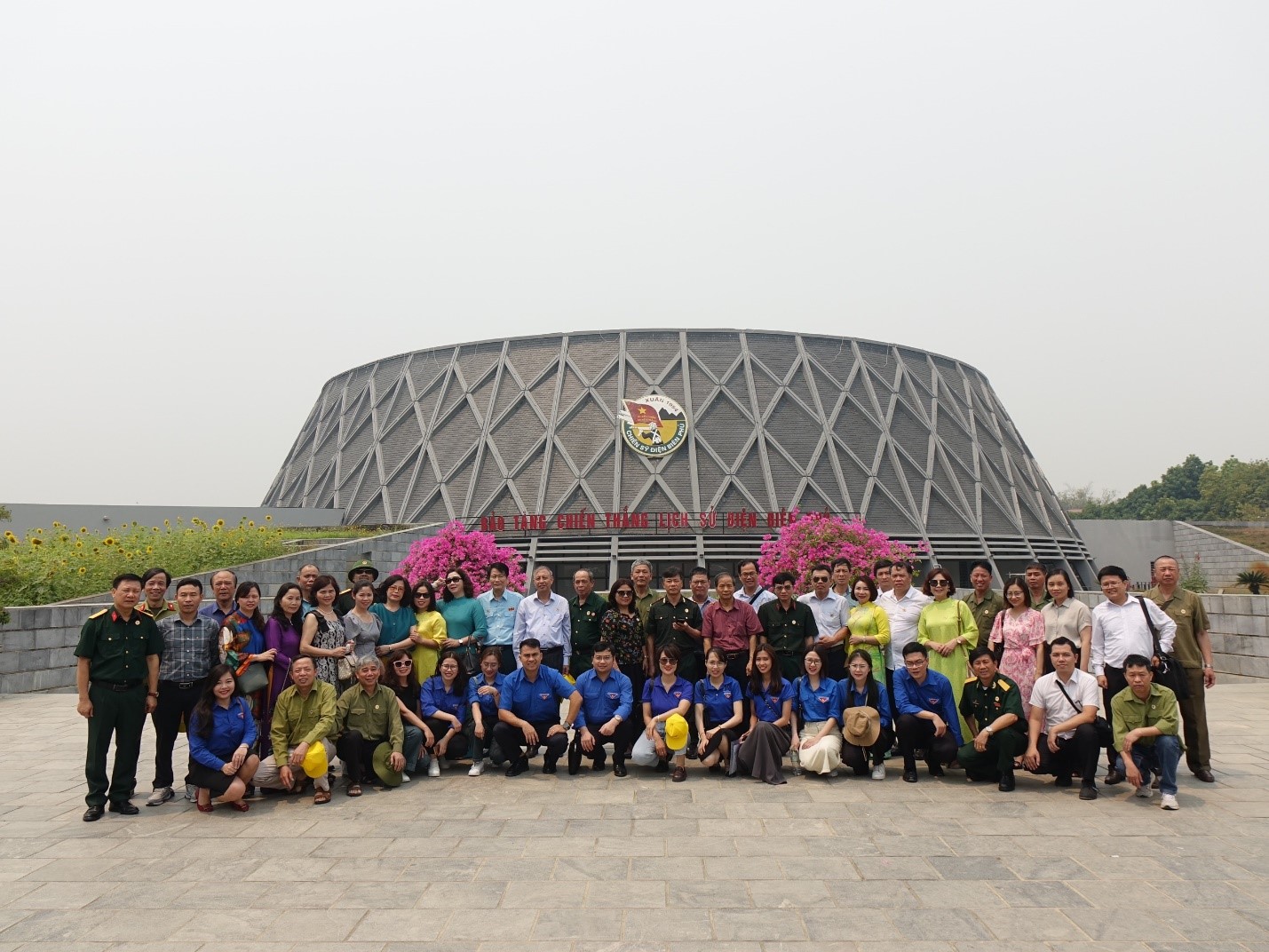 Hội Cựu chiến binh, Đoàn Thanh niên Viện Hàn lâm Khoa học xã hội Việt Nam đi thăm lại chiến trường xưa Điện Biên Phủ
Hội Cựu chiến binh, Đoàn Thanh niên Viện Hàn lâm Khoa học xã hội Việt Nam đi thăm lại chiến trường xưa Điện Biên Phủ
- Tổng mục lục Tạp chí 2023
-
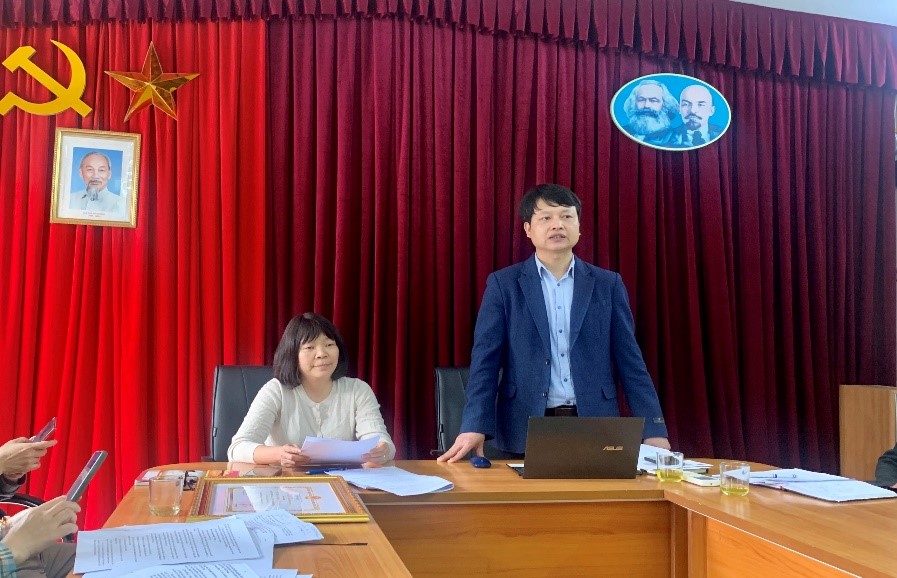 Viện nghiên cứu Gia đình và Giới phát động phong trào thi đua và ký Giao ước thi đua năm 2024
Viện nghiên cứu Gia đình và Giới phát động phong trào thi đua và ký Giao ước thi đua năm 2024
Liên kết web
Số lượt truy cập
23
5407463
Chi tiết tạp chíNo. 2 - 2020
Conference “Promoting the Elderly’s Resources in Socio-Economic Development in an Ageing Society”
On December 14, 2020, the Institute for Family and Gender Studies (IFGS) organized an international conference on "Promoting the elderly’s resources in socio-economic development in an aging society" under the framework of collaboration between the Vietnam Academy of Social Sciences (VASS) and the Japan International Cooperation Agency (JICA). The conference aimed to share recent research findings of the IFGS on the role of the elder in socio-economic development particularly about the demand for labor resources, employment, and the situation of labor and employment of the elderly and proposing policy proposals on related issues in the coming time.
Participants in the conference included representatives of agencies, organizations and scientists from Vietnam and Japan. On the Vietnamese side, there was the participation of Ms. Hoang Thi Thu Huyen, Chairman of Trade Union, Ministry of Labor, Invalids and Social Affairs (MOLISA); Mr. Nguyen Thanh Ha, Head of International Cooperation Department, Vietnam Academy of Social Sciences; Assoc. Prof. Tran Thi Minh Thi, Director of the Institute for Family and Gender Studies, Vietnam Academy of Social Sciences; representatives of the Central Vietnam Association of the Elderly, the Vietnam Women's Union, Department of Employment, Ministry of Labor, Invalids and Social Affairs, World Bank Vietnam, HelpAge Vietnam, universities and research institutes and representatives from other governmental departments, unions, NGOs, INGOs in Vietnam.
On the Japanese side, there was the participation of Mr. Miko Hayashi, First Secretary of the Embassy of Japan in Vietnam; Mr. Murooka Naomichi, Deputy Chief Representative of JICA office in Vietnam; Mr. Hiroaki Yashiro, Senior Investment Promotion Advisor - Ministry of Planning and Investment; Mr. Tsujimoto Ryo, Deloitte Vietnam Business & Finance Advisory Company Ltd; Mr. Ishiguro Yohei, project formulation advisor, JICA Vietnam; and Professor Tajika Eiji, an expert from JICA Vietnam (via online).
The conference started with the opening remarks by Assoc. Prof. Tran Thi Minh Thi, who outlined the current situation of the elderly in Vietnam and the purposes of the project. Over the past three decades, Vietnam's population has changed in both quantity and structure. The number of older persons aged 60 and over increased from 7.1% in 1989 to 10.2% in 2014, to 11.4% in 2017 and 13.5% in 2018, showing that Vietnam started the aging population. Currently, the majority of the elderly live in families in local communities. The number of older persons living in residential care unit is not large. Therefore, it is very important to learn the role of the elderly to adapt to changes in population and family structure and consider them as one of the resources in socio-economic development, not merely a dependent population that needs care and help. In that context, the Institute for Family and Gender Studies conducted several studies on this topic, including 1. Promoting the elderly’s resources in socio-economic development to adapt to the aging population context of Vietnam, supported by VASS and JICA; 2. Gender difference in participation in economic activities of the elderly, supported by MOLISA; and 3. The role of the elderly in aging Vietnamese society, supported by VASS. All three studies have been completed in 2020 and during this conference, the research team shared key findings on the economic involvement of the elderly and aims to find out the social positivity, autonomy, and needs of the elderly and the theoretical suggestions for the research as well as appropriate policy proposals based on lessons learned from Japan.
Mr. Murooka Naomichi, Deputy Chief Representative of JICA Office in Vietnam also welcomed the cooperation between JICA and VASS in the research project on the topic of the elderly, emphasized the significance of the conference in sharing the situation and learning experiences from each other of Vietnam and Japanese society. In ageing societies, various issues such as health care, learning and training opportunities, status and modality of employment and etc. are significant for researches and policy recommendations.
Mrs. Hoang Thi Thu Huyen, President of Trade Union, Ministry of Labor, Invalids and Social Affairs presented the report "Social issues in the Socio-Economic Development Strategy 2020-2030". She commented that Vietnam is in its bonus population but the ageing population process is becoming a great concern as well. Her presentation outlined challenges for workers, social security in the period 2010 - 2020, achievements in managing sustainable social development in the period 2011-2020 and outlined some suggestions and solutions for sustainable social development in the 2021 - 2030 period, such as developing policies to support and encourage enterprises to employ older workers, developing employment programs for the elderly, improving social security, reducing poverty and implementing comprehensive solutions.
A/P Tran Thi Minh Thi, Director of the Institute for Family and Gender Studies, presented the report "Economic participation of the elderly and the current policy issues". The report presented the results of the study on "The role of the elderly in aging Vietnamese society" conducted in Ninh Binh province by 2020 and the research on "Gender differences in economic activities of the elderly” (case study in Da Nang). The report indicated different dimensions of economic activities of the elderly such as income sources, the proportion of working older persons, level of their participation in paid and unpaid work, working purposes by gender, by location of residence; the current employment nature of the elderly and their current main jobs. The research showed that the majority of older people continue to work after retirement, the proportion of older people working in paid jobs is much lower than the unpaid and the traditional gender-based division of labor is still maintained in today's families. Since then, she also made some recommendations including promoting the labor participation of the elderly, building policies to promote the role of the elderly to adapt to the aging society.
Dr. Trinh Thai Quang, a research team member from the Institute for Family and Gender Studies presented the report on “Job demands and employment of the elderly in Vietnam (a case study in Da Nang). The report showed the main findings of the research on older persons participating in the labor market, job characteristics, type of job, working purposes, employment needs of older persons, their desired jobs, and advantages and disadvantages of the elderly in finding jobs.
Vietnamese and Japanese delegates actively discussed the topic of employment and policies for the elderly, health care for the elderly, compared the differences in the two countries, and raised lessons learned from the experience of each country. In regards to jobs for older people, Mr. Miko Hayashi, the First Secretary of the Japanese Embassy in Vietnam commented that there should be three pillars in promoting elder resources in ageing societies, which is job recruitment for elder among enterprises, establishment of job centers for the elder and social insurance coverage. Meanwhile, Mr. Tsujimoto Ryo commented that the speed of the ageing population in Vietnam is currently much faster than Japan’s which influences the financial situation of the country. Thus, older people should not be considered as care receivers but a potential labor force. The questions are how to take care of and support older people so that they can care for themselves and do their stuff. Some solutions could be considered including a long-term care system, home-based care to improve their health and get back to work.
Mr. Hiroaki Yashiro made a comparison between the social security policy between Vietnam and Japan. In Japan, there are different kinds of insurance including compensation insurance, health care insurance, national pension insurance that requires participation from 20 to 64 years old and are all subject to 30% copayment. People over 75 years old should have health care insurance. The representatives from Japan shared about some typical Japanese policies for the elderly, such as employment insurance to pay for the unemployed, people who quit their jobs to take care of children, the elderly, which apply for all employees who work over 20 hours/week; health insurance covers illnesses outside of work, maternity payments, 90% of nursing expenses for people over 75 years old; Retirement insurance: pay for the elderly, the injured, and the dead, apply to normal employees working for companies, part-time workers with working time more than 3/4 of the time of a normal employee.
Professor Tajika Eiji, the expert from JICA Vietnam, raised some questions to the conference that how the recruitment of older people in Vietnam is organized? What Vietnam has done so far to develop more jobs for older people? And some other questions related to the pension system and the government roles and enterprises in supporting older workers with working opportunities.
Mr. Nguyen Tam Giang, a representative from World Bank Vietnam mentioned other group of older people that would also need more attention from the government as well as the community, they are ethnic elderly, disabled elderly but able to work. He mentioned “the caring economy” where the elderly are a group that contributes to the care economy. Among the elderly, healthy people take care of those who are not healthy.
Japanese delegates commented that to cope with the aging population, Japan also adjusted their pension and retirement age; businesses must make adjustments to help the elderly; Japan also has many job placement centers for the elderly. The Japanese representative also hoped that these could be lessons learned for Viet Nam. Other delegates from Vietnam including those from Vietnam Women’s Association, HelpAge Vietnam raised their concerns about gender inequality among the older people population partly due to care duties. There need to be specific policies suitable for this population in regards to their working at a later age. They also indicated that it would be great if the Institute, MOLISA, and HelpAge could work together to conduct deeper studies on community-based initiatives for sustainable economic solutions.
Speaking at the conference, Mr. Nguyen Thanh Ha - Head of International Cooperation Department, Vietnam Academy of Social Sciences, thanked JICA for their 10-year companion with VASS, and VASS and JICA will work together to develop plans for the next 10 years.
At the end of the conference, A/P Tran Thi Minh Thi thanked the enthusiastic participation and fruitful exchange of opinions of representatives from agencies and organizations in Vietnam and Japan, appreciated the effective support from JICA Vietnam, MOLISA, Departments of VASS. The Director also expressed special thanks to the participation of Professor Tajika Eiji, the expert of JICA Vietnam who gave important comments and contribute to the success of the conference.
13th Next-Generation Global Workshop: “New Risks and Resilience in Asian Societies and the World”
According to the Decision No. 1093/QĐ-KHXH, dated July 13, 2020 of the President of Vietnam Academy of Social Sciences, Kyoto University, Japan and the Institute for Family and Gender Studies, Vietnam Academy of Social Sciences, and in colaboration with the Institute of Human Studies, Vietnam Academy of Social Sciences, and Vietnam Women Union. co-organised the 13th Next-Generation Global Workshop (NGGW) on 21st-23rd, November, 2020 in the headquarter of Vietnam Academy of Social Sciences, No 1, Lieu Giai street, Ba Dinh district, Ha Noi. It is an important activity in the official cooperation framework between Kyoto University, Japan and the Institute for Family and Gender Studies. The NGGW has been held annually by Kyoto University, Japan since 2008 to provide an opportunity for early-career scholars and postgraduate students to present their research and to obtain feedback from an professor of participating universities around the world. It has also served as an invaluable opportunity to scholars of different generations and various countries and territories to learn from one another and deepen their understanding of various social phenomena in the world in the globalization context, particularly in Asia.
With them theme of “New Risks and Resilience in Asian Societies and the World”, the workshop aims to explore how individuals, families, societies perceive and adapt to risks in a given socio-cultural setting, and investigate alternative dimensions of resilience from an interdisciplinary viewpoint. This is the first time the workshop co-organized between the research institutes and a mass organization (i.e. Vietnam Women’s Union) which has functions in policy advocacy, recommendation, monitoring and criticism. Therefore, parallel with acting as a forum for scholars, the workshop’s research findings will provide theoretical and practical baseline evidence for agencies in policy implementation and advocacy.
Due to the Covid-19 pandemic and the international movement restriction, this is also the first year the workshop combined between a virtual meeting in twelve countries and onsite meeting in Vietnam. In Vietnam, the workshop attracted the participants from various government agencies (National Assembly's Social Affairs Committee, Ministry of Labor, Invalids and Social Affairs, Vietnam Fatherland Front and Vietnam Women’s Union), embassies and international organizations such as Australian Embassy or International Organization for Migration, universities and research institutes (University of Social Sciences and Humanities Ha Noi, Ho Chi Minh city University of Social Sciences and Humanities, Vietnam’s Women Academy, Academy of Journalism and Communication, Vietnam National Institute of Culture and Art Studies, etc.), domestic organizations (Institute of Population, Family and Children , Research Centre for Gender, Family and Community Development, etc.), and scholars from Vietnam Academy of Social Sciences.
Regarding the online site, the workshop attracted 29 represents from eleven countries and territories in four continents including Canada, Hungary, Ukraine, Japan, China, Bangladesh, India, Malaysia, Singapore, Taiwan and Madagascar. There are 9 professors, associate professors or leaders of governmental agencies from six countries (the United Kingdom, Finland, Japan, Korea, China and India) chairing concurrent sessions. The workshop recorded 298 online visits from various parts in the world.
In the opening remarks, Assoc. Prof. Tran Thi Minh Thi – General director of the Institute for Family and Gender Studies introduced the history, reasons to choose to the workshop theme, goals and expected results of the workshop. The speech emphasized that the 13th NGGW will the workshop plays the role as a meaningful bridge between academic forum and policy advocacy to attend and discuss the arising risks and resilience in Asian societies and others, including European and North American societies which are facing similar issues and challenges. The research results presented in this workshop will serve as important scientific evidences to contribute to the process of constructive reviewing, revising and/or developing policies by state agencies and organizations in those societies in general, and in Viet Nam in particular, including the mass organization, ministries, and departments.
Then, Prof. Dang Nguyen Anh – Vice president of Vietnam Academy of Social Sciences, Prof. Emiko Ochiai, Director of Kyoto University Asian Studies Unit (KUASU), Kyoto University and Dr. Bui Thi Hoa, Vice president of Vietnam Women’s Union gave the opening speeches. Prof. Dang Nguyen Anh showed his appreciations to co-organize this interesting and meaningful global workshop with colleagues in Kyoto University and Vietnam Women’s Union and expressed gratitude to all partners’ continuous support and collaboration to have this workshop organized today regardless of geographical distance and the pandemic. Dr. Bui Thi Hoa highly appreciated the opportunity to be invited to co-organize this important workshop. Vietnam Women’s Union hopes that a vivid panorama of Asian society is described to help the Union to propose scientific evidence based interventions to contribute to ensure economic development and social sustainability of Asian countries.
The workshop included two plenary sessions and eighteen concurrent sessions. There were four presentations in two plenary sessions comprising of “Impacts of Covid 19 on gender relations” by Prof. Emiko Ochiai, Kyoto University, Japan, “Gender and Caste Violence in India: Past and Present” by Prof. Jyoti Atwal, Jawaharlal Nehru University, India, “Does community care? The Intergenerational Self-Help Clubs in Ha Tinh province, Vietnam” by Assoc. Prof. Kato Atsufumi, Kyoto Sangyo, Japan, and “Nutritional Status of the Reserved Category Educated Women in University Studies in India” by Emeritus Prof. Maitreyee Bardhan Roy, Adamas University, India. These presentations sketched an overall picture of significant changes in Asia societies in the contemporary globalization context.
There are 9 topics in 18 concurrent sessions in the workshop including (1) The impact of climate change and resilience in the face thereof; (2) Gender (in)equality; (3) Transformation of marriage and families; (4) Population aging and social issues; (5) Migration; (6) Social security, human security and human rights in Asia; (7) Labor market flexibility and adaptability; (8) Economic development patterns and trends; and (9) Pandemic. Each concurrent session has three presentations of junior researchers and postgraduate students. Besides the comments from online and offline participants as regular workshop, each presenter received detailed feedback from a professor who had been assigned to read the full papers to give comments. The professor’s comments will be important guiding ideas to help junior researchers and postgraduate students review and complete their papers to publish in the conference proceedings.
There were 54 full papers from the scholars in various countries presented in the concurrent sessions and 4 presentations were reported in the plenary session, and many of them are original works. After each presentation, there were fruitful discussions from professors, chairs, and audience both online and onsite. The participants of the workshop expressed their deep attitude for the great opportunity for formulation of new networking and friendship, gaining academic knowledge and the meaningful linkage between the academic research findings and implications to policy development and advocacy.
In the conclusion remarks of the workshop, the workshop organizing committee would like to thank all online and offline participants who attended the workshop and gave their useful comments. The participants highly appreciated the quality of the presentations at the workshop; the opportunity to exchange and gain knowledge about social sciences and interdisciplinary approach, especially knowledge about people’s response and adaptation to new circumstances. The participants also greatly valued the efforts and determination of the organizing committee in organizing an international workshop during the complicated situation of Covid-19 pandemic as well as in connecting scientists with policy advocacy agencies to bring research results closer to the policy advocacy process.
Abstract: After Vietnam's reunification in 1975, 1976 - 1986 is a historical period with specific economic characteristics. However, studies on this period in general, and this topic in particular are limited. The objectives of this paper are to describe the activities of agricultural cooperatives, and to define the roles of households and cooperatives in ownership, product distribution and labor division during the post-war period. We applied quantitative analysis to data from 346 selected samples out of 411 married household representatives during the period of 1975-1985 . We used information from 15 in-depth interviews and 02 group discussions to provide explanations for the quantitative results. The research analyses show that in terms of quantitative data, in all aspects of activities, the level of participation in the cooperatives was identified as “passive” in more than 99% of the households. The analyses prove that in terms of policies and mechanism, social structure is the most powerful factor affecting the households’ passive participation in agricultural cooperatives. This study confirms the passivity of the cooperative members under the centralized subsidy bureaucracy through the voice of the Vietnamese people who participated in the cooperatives.
Performance of Women’s Role in Disaster Response in Vietnamese Rural Families Today
Abstract: Vietnam is one of the countries most vulnerable to natural disasters. More than 70% of Vietnam's population has been affected by natural disasters and climate change at many different levels. Women in Vietnam, especially ethnic minority women, rural women and women living in mountainous areas are at highest risk of natural disasters because they work in agriculture and this type of work depends on the weather, natural conditions and natural resources such as soil, water and climate... This paper uses quantitative and qualitative data from the research “The response of women in Central Vietnam to climate change” with 368 household questionnaires and 25 in-depth interviews conducted in Ninh Thuan province in 2017. By analyzing documents and doing frequency, correlation and logistic regression analysis, the research results show that people in community in general and members in family in particular have suffered the influence of disasters in different ways. Gender gaps have been found in the level of suffering from natural disasters as well as in the way of responding to natural disasters. Women play a very important role in coping with natural disasters, but due to the unequal distribution of rights, resources and cultural standards, women have confronted a lot of difficulties in disasters response, especially in the context of climate change today.
Social Work for Sexual Abused Children in Kontum Province
Abstract: Over the past years, with the attention of both the Vietnamese political system and the entire society, the system of policies and laws on child abuse prevention and control has been gradually completed, synchronously. However, cases of abused children still happen, many of which are serious. There are still many cases of children being abused but have not been detected in time and adequately to handle, especially acts of child sexual abuse. The awareness and implementation of guidelines, policies and laws to support sexually abused children by local social workers plays a decisive role in the effectiveness of the protection of children's rights. Therefore, this study aims to contribute to the awareness and implementation of policies to support sexually abused children in Kontum province of social workers including social staffs, child care and protection officers, and communal and ward collaborators.
Intergenerational Conflict between Adolescents and their Parents (Case Study in Hanoi)
Abstract: The parent-children relationship changes alongside the grow-up of children, especially during children’s adolescence period when children strive for more autonomy, independence and equality in the relationship with parents. In this transition, many children, when struggling to establish their identity as independent social individuals, may act out and oppose their parents, putting strains and conflicts on parent-child relationship. Using survey data from a research conducted by the Institute for Family and Gender Studies in 2020 in Ha Noi, with a sample of about 575 adolescents from both rural and urban areas, this paper describes the nature of conflict between parents and adolescents in Ha Noi. Results show that three topics of conflict which occur the most frequently and the most seriously is: using technologies/Internet, doing homework and academic achievement. Moreover, the frequency and intensity of conflicts between adolescents and mothers are higher than with fathers. Male adolescents have conflicts with parents over study issues more frequently than female adolescents. In urban, adolescents have more conflicts related to study than who lives in rural, and the intensity of conflict in urban is higher than in urban.
Sanitary Latrine Use in Vietnam
Abstract: Adequate access to safe drinking water and hygienic toilets are basic needs required to ensure good public health. However, access to safe water and sanitation facilities remains a formidable challenge in developing countries. This paper presents the findings of an analysis of the situation, trends and demographic and socio-economic factors associated with sanitary latrine use among household members, particularly among children 0-17 years of age. The analysis was conducted using data from 2000, 2006, 2001 and 2014 Vietnam Multiple Indicator Cluster Surveys (MICS). Considerable improvement in ownership and use of sanitary latrines was observed among population during the past 15 years. While the trends improved rapidly from 2000 to 2011, it slowed down from 2011 to 2014. Among children aged 0-17 years, 75.9% of them had access to sanitary latrine use in 2014. The analysis has identified a number of key factors such as ethnicity, poverty, lack of education and access to drinking water affecting households to adopt use of sanitary latrines. These findings suggest that improved sanitation including access to sanitary latrines in the population should go along with other development goals that Vietnam is current implementation such as poverty and hunger reduction, gender equality, child health and nutrition and access to safe drinking water.

